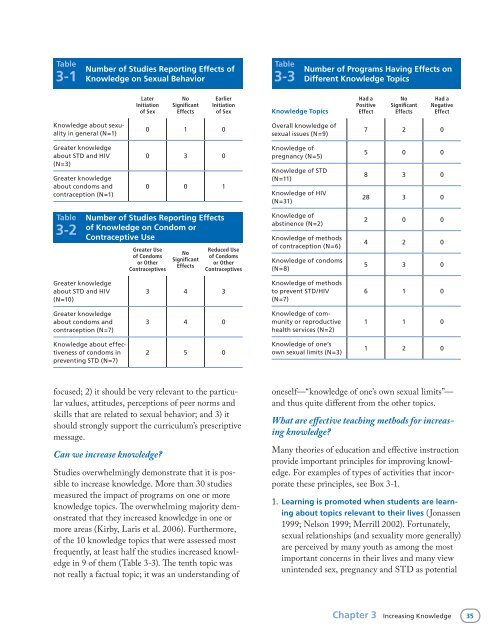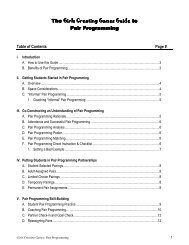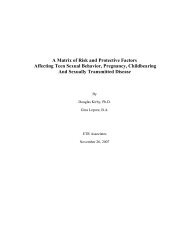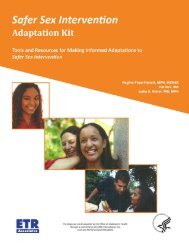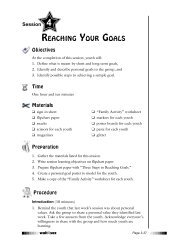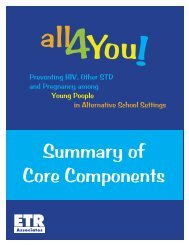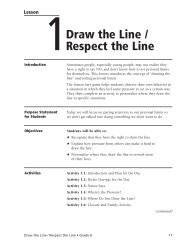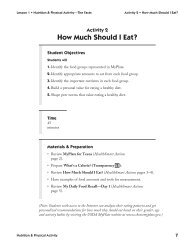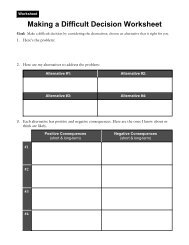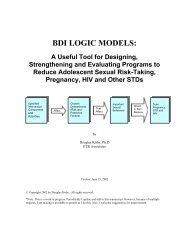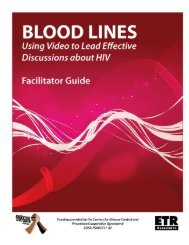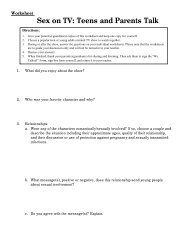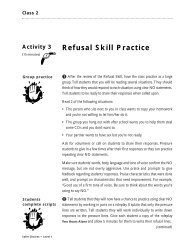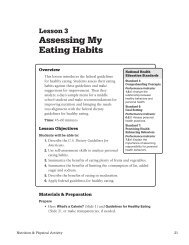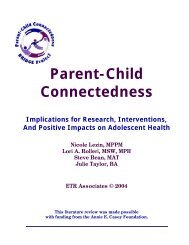e shaped more by their peers and the media andthey may be more likely to engage in sexual activityat an earlier age. If youth do not know that condomsprovide considerable protection against pregnancyand STDs, their attitudes towards condoms maybe more negative and they may be less likely to usecondoms during sexual activity. If youth know howto use condoms or other methods of contraceptionproperly, they are more likely to feel confident usingcondoms or other methods of contraception andactually use them properly.When applying these general concepts to sexualbehavior, four questions should be asked:1. Does teens’ knowledge about different aspects ofsexuality affect their sexual behavior?2. Can we increase knowledge?3. What are the most effective teaching methods forincreasing knowledge?4. What topic areas are most commonly covered incurricula that effectively change sexual behavior?These questions are answered below.Does teens’ knowledge about different aspects ofsexuality affect their sexual behavior?Contrary to what many sexuality educators typicallybelieve, knowledge about sexuality is not allthat highly related to behavior (Tables 3-1 and 3-2).In particular, there is little evidence that knowledgeabout sexuality in general, knowledge about sexuallytransmitted disease (including HIV), or knowledgeabout condoms and contraception is significantlyrelated to the initiation of sex (Table 3-1) (Kirby andLepore 2007). There is very mixed evidence thatknowledge about STD and HIV is related to condomuse (Table 3-2). Finally, there is some evidence,but not always consistent evidence, that knowledgeabout condoms and contraception and their effectivenessis related to condom or contraceptive use.What do these findings mean? How can these findingsbe so inconsistent with the very plausible beliefthat knowledge is needed to provide a foundation forbehavior change?There are at least three partial answers to thesequestions.1. Most young people already know the basics aboutsexual behavior, condoms, contraception, pregnancyand STD, so greater knowledge may notmarkedly affect their behavior.2. The knowledge tests used in these studies may notmeasure the particular facts that are most importantin changing behavior.3. Greater knowledge may improve attitudes, perceptionsof peer norms or skills. These mediatingfactors in turn may affect behavior, but the statisticalanalyses may not always capture this indirectimpact of knowledge on behavior.Nevertheless, the conclusion from these studies isquite clear: if the goal of a program is to changebehavior, it is important to focus on knowledge thatmost directly relates to values, attitudes, perceptionsof peer norms and skills of a specific behavior, ratherthan general knowledge. For example, accurateknowledge about the risk of pregnancy and STDsand the effectiveness of prevention methods mayimprove attitudes about use of condoms and otherforms of contraception, and, in turn, increase theiruse, but general knowledge about sexuality may nothave an impact on sexual behavior.This conclusion is consistent with other kinds ofresearch. In particular, multiple studies have demonstratedthat presenting a clear message about sexualbehavior is an important characteristic of effectiveprograms (Kirby, Laris et al. 2006). A common,clear message is:“Always avoid unprotected sexual activity.Abstinence is the safest choice. If you engagein sexual activity, always use protection againstpregnancy and STDs.”One way that programs can make a compelling casefor a particular behavioral message is by emphasizingall the facts and concepts that support thatmessage.In sum, the overall message from all of these studiesis: Knowledge should be taught, but 1) it should be34 <strong>Reducing</strong> <strong>Adolescent</strong> <strong>Sexual</strong> <strong>Risk</strong>: A <strong>Theoretical</strong> Guide for Developing and Adapting Curriculum-Based Programs
Table3-1Number of Studies Reporting Effects ofKnowledge on <strong>Sexual</strong> BehaviorTable3-3Number of Programs Having Effects onDifferent Knowledge TopicsLaterInitiationof SexNoSignificantEffectsEarlierInitiationof SexKnowledge TopicsHad aPositiveEffectNoSignificantEffectsHad aNegativeEffectKnowledge about sexualityin general (N=1)0 1 0Overall knowledge ofsexual issues (N=9)7 2 0Greater knowledgeabout STD and HIV(N=3)Greater knowledgeabout condoms andcontraception (N=1)0 3 00 0 1Knowledge ofpregnancy (N=5)Knowledge of STD(N=11)Knowledge of HIV(N=31)5 0 08 3 028 3 0Table3-2Number of Studies Reporting Effectsof Knowledge on Condom orContraceptive UseGreater Useof Condomsor OtherContraceptivesNoSignificantEffectsReduced Useof Condomsor OtherContraceptivesKnowledge ofabstinence (N=2)Knowledge of methodsof contraception (N=6)Knowledge of condoms(N=8)2 0 04 2 05 3 0Greater knowledgeabout STD and HIV(N=10)3 4 3Knowledge of methodsto prevent STD/HIV(N=7)6 1 0Greater knowledgeabout condoms andcontraception (N=7)3 4 0Knowledge of communityor reproductivehealth services (N=2)1 1 0Knowledge about effectivenessof condoms inpreventing STD (N=7)2 5 0Knowledge of one’sown sexual limits (N=3)1 2 0focused; 2) it should be very relevant to the particularvalues, attitudes, perceptions of peer norms andskills that are related to sexual behavior; and 3) itshould strongly support the curriculum’s prescriptivemessage.Can we increase knowledge?Studies overwhelmingly demonstrate that it is possibleto increase knowledge. More than 30 studiesmeasured the impact of programs on one or moreknowledge topics. The overwhelming majority demonstratedthat they increased knowledge in one ormore areas (Kirby, Laris et al. 2006). Furthermore,of the 10 knowledge topics that were assessed mostfrequently, at least half the studies increased knowledgein 9 of them (Table 3-3). The tenth topic wasnot really a factual topic; it was an understanding ofoneself—“knowledge of one’s own sexual limits”—and thus quite different from the other topics.What are effective teaching methods for increasingknowledge?Many theories of education and effective instructionprovide important principles for improving knowledge.For examples of types of activities that incorporatethese principles, see Box 3-1.1. Learning is promoted when students are learningabout topics relevant to their lives (Jonassen1999; Nelson 1999; Merrill 2002). Fortunately,sexual relationships (and sexuality more generally)are perceived by many youth as among the mostimportant concerns in their lives and many viewunintended sex, pregnancy and STD as potentialChapter 3 Increasing Knowledge 35
- Page 1: Reducing AdolescentSexual RiskA The
- Page 4 and 5: ETR Associates (Education, Training
- Page 6 and 7: AcknowledgmentsThis book evolved ou
- Page 8 and 9: Activities, Boxes and FiguresActivi
- Page 11 and 12: 1 IntroductionThis book was created
- Page 13 and 14: • Children of teenage mothers are
- Page 15 and 16: Table1-2 The 17 Characteristics of
- Page 17: Each of the following chapters focu
- Page 20 and 21: “determinants,” “behaviors,
- Page 22 and 23: model, provide evidence regarding h
- Page 24 and 25: to avoid unwanted sex and then synt
- Page 26 and 27: Figure2-3 An Example of a Logic Mod
- Page 28 and 29: Figure2-3 An Example of a Logic Mod
- Page 30 and 31: Figure2-3 An Example of a Logic Mod
- Page 32 and 33: Table2-2Learning Objectives to Redu
- Page 34 and 35: Table2-2Learning Objectives to Redu
- Page 36 and 37: Table2-3Learning Objectives to Incr
- Page 38 and 39: Table2-4Learning Objectives to Incr
- Page 40 and 41: Table2-6Learning Objectives to Incr
- Page 43: 3 Increasing KnowledgeKeys to Incre
- Page 47 and 48: Box3-1Types of Activities to Increa
- Page 49 and 50: partner does not mind using a condo
- Page 51 and 52: methods more often. For example, th
- Page 53 and 54: 4ImprovingPerceptions of Risks—Bo
- Page 55 and 56: 1. Do teens’ perceptions of risk
- Page 57 and 58: a. Presentations and discussions of
- Page 59 and 60: Table4-5Examples of Items That Have
- Page 61 and 62: Pregnancy Risk Activity and Follow-
- Page 63 and 64: STD Handshake(Continued)Important C
- Page 65 and 66: 5AddressingAttitudes,Values and Bel
- Page 67 and 68: Theories ofAttitude ChangeAttitudes
- Page 69 and 70: Although both quality and quantity
- Page 71 and 72: • When arguments are presented by
- Page 73 and 74: that it is possible to improve thes
- Page 75 and 76: c. Use simulations to demonstrate p
- Page 77 and 78: Table5-4Examples of Survey Items fr
- Page 79 and 80: Table5-4Examples of Survey Items fr
- Page 81 and 82: Activity 5-2Dreams, Goals and Value
- Page 83 and 84: Activity 5-4“Dear Abby”Descript
- Page 85 and 86: 6CorrectingPerceptionsof Peer Norms
- Page 87 and 88: Is there a gap between perceptions
- Page 89 and 90: 3. Use concepts, language, symbols,
- Page 91 and 92: Table6-4Examples of Items That Have
- Page 93 and 94: 7 Increasing Self-Efficacy and Skil
- Page 95 and 96:
feelings may reduce their self-effi
- Page 97 and 98:
situations more difficult so that t
- Page 99 and 100:
paper (e.g., the air should be sque
- Page 101 and 102:
Activity 7-1Lines That People Use t
- Page 103 and 104:
Situations That May Lead to Unwante
- Page 105 and 106:
Roleplaying to Enhance Refusal Skil
- Page 107:
Activity 7-5Using Condoms Correctly
- Page 110 and 111:
chaperoned, they may not have the o
- Page 112 and 113:
attitudes about condoms and contrac
- Page 114 and 115:
Activity 8-1Description of Activity
- Page 117 and 118:
9IncreasingParent-ChildCommunicatio
- Page 119 and 120:
ehavior may be quite complex (Jacca
- Page 121 and 122:
5. Give students multiple homework
- Page 123 and 124:
and the activities suggested prior
- Page 125 and 126:
Activity 9-1Description of Activity
- Page 127 and 128:
Activity 9-3Human Sexuality Board G
- Page 129 and 130:
10 ConclusionsKeys to Reducing Sexu
- Page 131 and 132:
Figure10-1Assessing Factors in Curr
- Page 133 and 134:
sexual minority youth and pressure
- Page 135 and 136:
Table10-1Instructional Principles I
- Page 137:
Table10-1Instructional Principles I
- Page 140 and 141:
Incidence The number of new cases o
- Page 143 and 144:
ResourcesThree kinds of resources a
- Page 145 and 146:
Science-Based Practices: A Guide fo
- Page 147 and 148:
National Longitudinal Study of Adol
- Page 149 and 150:
Changing Social Normshttp://www.etr
- Page 151 and 152:
Advocates for Youth, Young Women of
- Page 153 and 154:
ReferencesAbelson, R., and Prentice
- Page 155 and 156:
Coyle, K. (2006). All4You2! Prevent
- Page 157 and 158:
Lapsey, D.K. (1993). Toward an inte
- Page 159 and 160:
Weed, S.E., Olsen, J.A., DeGaston,


